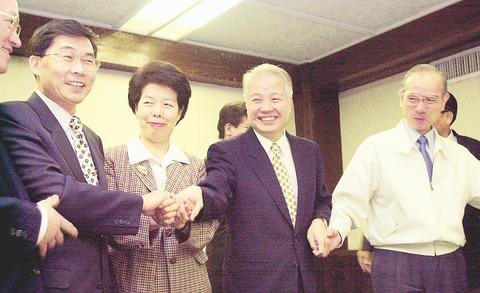One of the pan-blue camp's Kaohsiung mayoral candidates dropped out of KMT-PFP deliberations, leaving three candidates to compete for the nomination.
Convener of the political reform group Mountain (
"His suggestion that all of the pan-blue candidates hold three public debates before the KMT and PFP began conducting opinion polls [to decide on a joint candidate] was rebuffed. Only Huang Jun-ying (

PHOTO: GEORGE TSORNG, TAIPEI TIMES
"It's regrettable to see that closed-door political negotiations are still going on," Shih later told the press.
In order to resolve the long-standing candidacy problem, KMT Secretary-General Lin Fong-cheng (林豐正) and PFP Secretary-General David Chung (鍾榮吉) invited the four potential candidates to a negotiating session held yesterday afternoon.
The negotiations were held to come up with a set of plans acceptable to the four candidates for selecting a final contestant to represent the pan-blue camp in Kaohsiung.
It was the first time that the contestants, except for Shih -- former deputy mayor of Kaohsiung Huang Jun-ying from the KMT, PFP Vice Chairman Chang Chao-hsiung (
All three said they "would respect the negotiating process" when interviewed prior to the meeting.
With only three months away from the polling day, the pan-blue camp has decided to select one of the three existing candidates based on their approval ratings in opinion polls. The possibility of holding forums for candidates to announce their campaign platforms was ruled out.
Chairman of the KMT's organizational development committee James Chen (陳健治) said since both parties have agreed to use opinion polls as the selection standard, the three contestants should do everything they can to solicit support. He also urged the three to accept the result because "now it's Kaohsiung citizens, not the KMT or the PFP, that will nominate the candidate," Chen added.
Later yesterday, the pan-blue camp decided to have their candidates hold a televised policy debate on Sept. 13 before conducting a poll to decide on a candidate in mid-September.

MAKING WAVES: China’s maritime militia could become a nontraditional threat in war, clogging up shipping lanes to prevent US or Japanese intervention, a report said About 1,900 Chinese ships flying flags of convenience and fishing vessels that participated in China’s military exercises around Taiwan last month and in January last year have been listed for monitoring, Coast Guard Administration (CGA) Deputy Director-General Hsieh Ching-chin (謝慶欽) said yesterday. Following amendments to the Commercial Port Act (商港法) and the Law of Ships (船舶法) last month, the CGA can designate possible berthing areas or deny ports of call for vessels suspected of loitering around areas where undersea cables can be accessed, Oceans Affairs Council Minister Kuan Bi-ling (管碧玲) said. The list of suspected ships, originally 300, had risen to about

DAREDEVIL: Honnold said it had always been a dream of his to climb Taipei 101, while a Netflix producer said the skyscraper was ‘a real icon of this country’ US climber Alex Honnold yesterday took on Taiwan’s tallest building, becoming the first person to scale Taipei 101 without a rope, harness or safety net. Hundreds of spectators gathered at the base of the 101-story skyscraper to watch Honnold, 40, embark on his daredevil feat, which was also broadcast live on Netflix. Dressed in a red T-shirt and yellow custom-made climbing shoes, Honnold swiftly moved up the southeast face of the glass and steel building. At one point, he stepped onto a platform midway up to wave down at fans and onlookers who were taking photos. People watching from inside

Japan’s strategic alliance with the US would collapse if Tokyo were to turn away from a conflict in Taiwan, Japanese Prime Minister Sanae Takaichi said yesterday, but distanced herself from previous comments that suggested a possible military response in such an event. Takaichi expressed her latest views on a nationally broadcast TV program late on Monday, where an opposition party leader criticized her for igniting tensions with China with the earlier remarks. Ties between Japan and China have sunk to the worst level in years after Takaichi said in November that a hypothetical Chinese attack on Taiwan could bring about a Japanese

STREAMLINED: The dedicated funding would allow the US to transfer equipment to Taiwan when needed and order upgraded replacements for stockpiles, a source said The US House of Representatives on Thursday passed a defense appropriations bill totaling US$838.7 billion, of which US$1 billion is to be allocated to reinforcing security cooperation with Taiwan and US$150 million to replace defense articles provided to the nation. These are part of the Consolidated Appropriation Act, which the US House yesterday passed with 341 votes in favor and 88 against. The act must be passed by the US Senate before Friday next week to avoid another government shutdown. The US House Committee on Appropriations on Monday unveiled the act, saying that it allocates US$1 billion for the Taiwan Security Cooperation Initiative